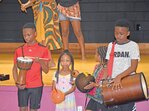
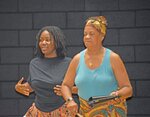
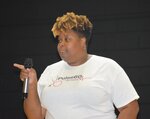
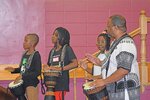
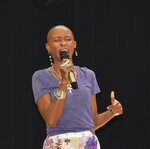

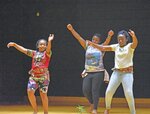
Over 20 students attended Freedom Camp held at Blackville-Hilda High School (BHHS) to learn about their heritage through fine arts and interactive teaching.
“I’ve always had an interest in being able to come back and give the same things that have been deposited in me over the years,” said Dr. Shaneen Dials-Corujo, Blackville native and camp director/founder who is now a professor at Benedict College.
Freedom Camp is a three-day exploration into African-American culture, identity, and expression through education, music, and dance. On the third day, campers take a field trip to Charleston to the International African-American Museum.
Although the camp feels like a whirlwind for both organizers and participants, they are fully invested in each component and eager to learn new things about their culture and themselves.
Dr. Dials-Corujo learned about the importance of self-efficacy in part from individuals who now help her orchestrate the camp and studies the topic in her work in psychology. She describes self-efficacy as “when you understand the essence of who you are, you’re more confident in your ability to complete a given task.”
Victor Jones and Linda Faust-Keyton of the Blackville-based Phoenix Project bring the fine arts component of the camp through music and dance, respectively. Both were mentor figures to Dr. Dials-Corujo and are excited to share their expertise with the younger generation.
All children in the camp focus on Black studies and safety from Shavon Sanders of Pulse 60 based in Blackville, but can delve into the fine arts component based on their interests. Campers are not required to participate but are encouraged to explore what the drum ensemble and dance movements are about.
While Jones and Faust-Keyton bring the artistic elements to the camp, Uhuru Academy brings the educational component. Uhuru Academy was founded by Nkoyo Ojuok and her husband, who is affectionately known as Baba Amin Ojuok.
Uhuru Academy is an online school serving over 50 students both nationally and internationally. Originally based in Texas, the school has multiple satellite branches including Columbia.
“Our mission and vision is always to spread our history wherever we go, so being able to do that here was very important,” said Ojuok. “Especially in Blackville, it resonates with us.”
Ojuok explained the history they teach at Uhuru Academy as well as at the Freedom Camp begins before the Civil War era of slavery. The campers are taught with a focus on encouragement and empowerment of their ancestors.
“We wanted to give those key components that led up to the Civil War so that we ended that to always let our children know we are always fighting. We’re fighting now, and we fought then,” said Ojuok. “You just weren't enslaved on plantations doing work for others, these were the other things to process.”
Campers learn through an animated style of teaching hitting key points in an oratory form. Due to only having two days to digest the information, Ojuok does a call and response style of learning. She makes statements or asks questions and the campers respond with their thoughts and ideas.
“We had to structure that to give those points that they can remember,” said Ojuok. “Because it was going to be a three-day camp, we were wanting to give the key facts.”
A part of the curriculum is linking it locally. Blackville’s rich history allows for the campers to feel connected to the information not only culturally but in a sense of physical location.
“The students that we have are so bright and so brilliant they pick it up in a very short period,” said Dr. Dials-Corujo. “The kids came thirsty and just really willing to work and put in the extra effort.”
Dr. Dials-Corujo noticed growth in the students even after just three days. She explained how one camper who was hesitant to get on the stage last year, got involved in the dance component and performed this year.
Students are not only taught history and fine arts, but confidence. They are encouraged to articulate how they feel and who they are.
“In a day and a half, some come in kind of shy. Then you see them embrace those aspects like the music,” said Dr. Dials-Corujo. “If I can’t necessarily tell you what I feel, then I can tell you through song, I can put it to dance or beat it out with the drums.”
The camp maintained the number of participants from last year and organizers hope to continue building on the groundwork they have laid.
“Hopefully the kids will get to understand what we are doing so when we bring new kids in, the older kids already know and they can help teach,” said Jones, who describes this camp as “a growing process for the kids and the adults.”
As the camp broadens its reach, Dr. Dials-Corujo hopes it can be held multiple times a year for “anyone who wants to learn this information, we want this to be a community thing,” she said.